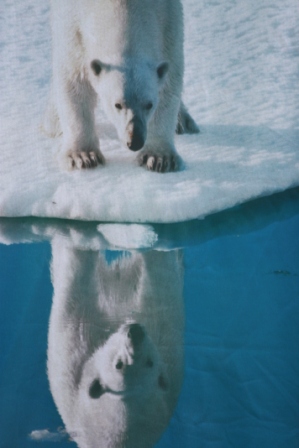No ban on bear trade
The debate over whether the trade in polar bear fur and other body parts should be banned has to have been one of the most confusing conservation and climate issues in the headlines over the last week. The meeting of the Convention on International Trade in Endangered Species (CITES) in Bangkok has rejected calls for a ban.
The trouble is that conservationists were divided on the issue. There is widespread agreement that the polar bear population is at risk from habitat loss because of the melting Arctic sea ice, on which it hunts and feeds. The question up for debate at the CITES meeting, though, was whether international trade also puts the bears at risk of extinction. The USA was proposing the ban, arguing that the polar bear population could decline by two-thirds by 2050.
“The continued harvest of polar bears to supply the commercial international trade is not sustainable”, said Dan Ashe, head of the US delegation. Canada, which has the largest portion of the polar bear population, was against the ban. Canada is also the only country that exports polar bear parts. The country says it needs to preserve the traditions of the Inuit. Clearly, protecting the heritage and traditions of the Inuit or other indigenous peoples is an important issue in our globalised age, where minorities struggle to hold on to their identities. But that argument can be used as an excuse for other activities. Is it justifiable to hunt an animal under threat to sell its fur at a huge profit on the international market? I cannot accept the argument some people put forward that a trade ban would detract attention from the real problem of climate change. Sure, climate change is the biggest threat. That means we have to cut emissions – but don’t we also have to do everything we can to reduce pressure on endangered species in the meantime? My colleague Damian Carrington from the Guardian does not mince words here. “Politics trumps precaution every time” is the heading of one of his blog posts from Bangkok.
The issue is not an easy one. The EU abstained from the vote because of opposition from Denmark, as bears are hunted by the Inuit population of Greenland, which still belongs to Denmark. Germany, the UK, the Netherlands and Belgium were in favour of the ban. Russia was with the USA in calling for a ban to protect its bears from poaching. WWF, normally upfront on bear protection, was opposed to the ban.
Whatever the arguments behind the rejection of the ban – it certainly won’t help the iconic species that has come to symbolise the threat to the Arctic. The only positive thing to come out of this is that world attention has been focussed on polar bears and on climate change in the Arctic – and indirectly on the political and economic interests that make some players less keen than others to do something about it.
















